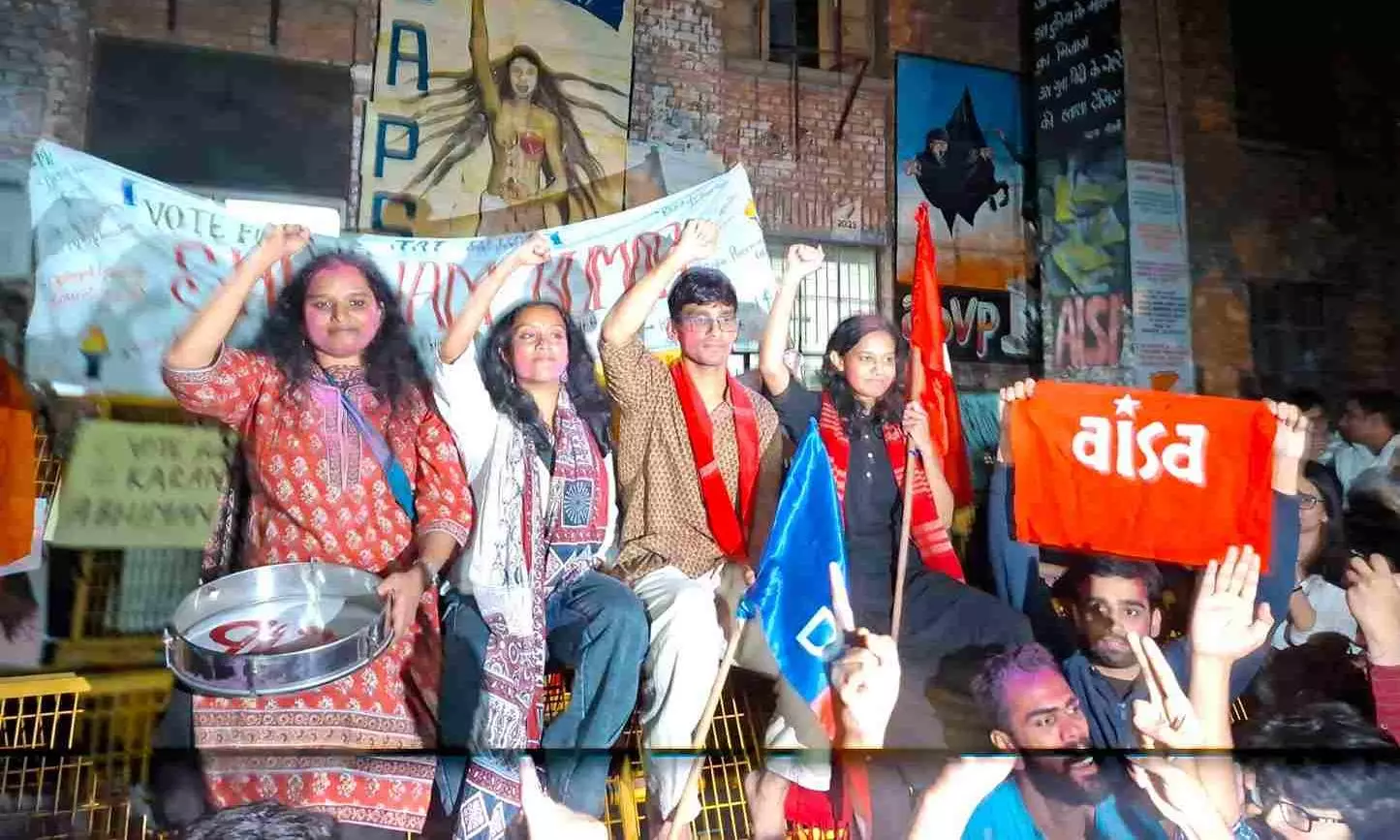
Reunited Left reclaims JNU students’ union, ABVP loses all key posts
After reuniting AISA, SFI, and DSF, the Left bloc regains complete control of the JNU students’ union, while ABVP suffers major losses despite close contests in two seats

A reunited Left swept the Jawaharlal Nehru University Students’ Union (JNUSU) elections on Thursday (November 6), winning all four central panel posts. A total of 5,802 votes were cast in the polls held on November 4.
After the split in the last elections handed the Akhil Bharatiya Vidyarthi Parishad (ABVP) the joint secretary post for the first time in a decade, the All India Students’ Association (AISA) and Students’ Federation of India (SFI) renewed the alliance, and along with the Democratic Students’ Federation (DSF), registered a decisive mandate.
ABVP trails in close contests
In the results declared on Thursday night, the ABVP came second on all seats – president, vice-president, general secretary, and joint secretary. For long stretches of Thursday morning and afternoon, it even held the advantage in key races. The general secretary contest, in particular, saw a nail-biting finish, with ABVP’s Rajeshwar Kant Dubey leading until the final phase of counting, before DSF’s Sunil Yadav edged ahead when barely 800 votes were left. He ultimately got 2,005 votes, defeating Dubey, who got 1,901.
Also read | JNUSU elections: Left-ABVP locked in fierce battle amid rising student concerns
For the joint secretary post too, there was a see-saw with ABVP’s Anuj Damara taking a narrow lead for a short while, until AISA’s Danish Ali pulled decisively ahead and secured 2,083 votes, beating Damara, who got 1,797. In the last elections, held in April this year, ABVP had won the post by 85 votes.
Apart from the joint secretary, AISA also secured the top post of president with Aditi Mishra, who polled 1,937 votes, defeating ABVP’s Vikas Patel (1,488 votes). The Progressive Students’ Association (PSA), an independent Left group that had aligned with the SFI and Birsa Ambedkar Phule Students’ Association (BAPSA) last time, recorded a commendable performance in the presidential race, with its candidate Shinde Vijayalaxmi Vyankat Rao securing 1,276 votes and finishing third.
Progressive camp remains divided
Mishra contended that the narrow margins in the two lower posts reflected not the ABVP’s strength but the fragmentation of the “progressive” vote.
“It’s not as if the ABVP secured half the student mandate. Several candidates from other progressive organisations also contested for those posts, which is why the contest between Left Unity and ABVP was close. Some swing votes went to these progressive groups rather than to the ABVP,” she told The Federal.
Apart from the Left, the other contenders for the “progressive” vote in the race for general secretary were Shuaib Khan from BAPSA (796 votes), Preeti from NSUI (442 votes) and Gopi Krishnan U from the All India Students’ Federation (AISF) with 264 votes. Similarly, for the post of joint secretary, Chhatra Rashtriya Janata Dal’s Ravi Raj, Progressive Democratic Students’ Union’s Manmohan Mitruka, and NSUI’s Kuldeep Ojha polled 876, 466 and 221 votes, respectively.
According to sources, PSA and AISF had expressed interest in joining the Left Unity panel, but the alliance ultimately did not materialise.
Gopika leads decisive victory
The Left Unity panel scored its most emphatic victory in the vice-presidential race, in which SFI’s K Gopika Babu (3,101 votes) beat ABVP’s Tanya Kumari (1,787 votes) by a massive margin of 1,314 votes. This was partly due to Gopika’s popularity and partly because the vice-presidential race was the most direct, with only three candidates contesting, compared to seven for president and five each for general secretary and joint secretary.
Speaking to The Federal on voting day, Babu had said, “There was no chance” of ABVP winning on any seat. “We’re confident that students have recognised the violence perpetuated by the ABVP. Misogyny and patriarchy are already entrenched in the RSS. To resist the Modi government’s push for privatisation and corporatisation, students need a union that can stand up to such attacks on the university,” she had said.
Last time, the ABVP won not just the post of joint secretary, but also roughly 20 councillor seats in various schools of JNU. This time around, the Left pre-empted confusion by closing ranks well before nominations. As a result, the ABVP was wiped out not just from the central panel, but their councillor seats also came down to 14. Interestingly, the School of Social Sciences (SSS), which the ABVP was able to penetrate last time by gaining two councillor seats, a first in 25 years, spelled doom for it this time around. It was the last 1,400 votes from SSS, which turned the tide in favour of the Left for the two lower posts.
Left vows campus reforms
Yet, the organisation insists it has been steadily gaining ground on campus. “We were confident of winning, but the Left organisations formed an alliance, and that affected the outcome. These groups, which often criticise and oppose each other, came together solely to defeat us. Even so, we managed to give a tough fight on two posts and remain the single largest organisation in JNU,” said ABVP JNU media convenor Vijay Jayaswal.
Also read | Tensions flare at JNU as Left groups clash with police during protest against ABVP
Having managed to push the ABVP out of the JNUSU, the Left Unity Panel said it will now focus on addressing students’ issues.
“The students demanded that there be unity, because most of the students don’t want the violence parishad (ABVP) here. Now, we will focus on the reinstatement of GSCASH (Gender Sensitisation Committee Against Sexual Harassment), the increment of merit-cum-means scholarship, better infrastructure for libraries, hostels and labs for science students, and a basic subscription to JSTOR (a digital library of journals and books). We will also push for restarting JNU’s own entrance exam,” said JNUSU president-elect Aditi Mishra.

